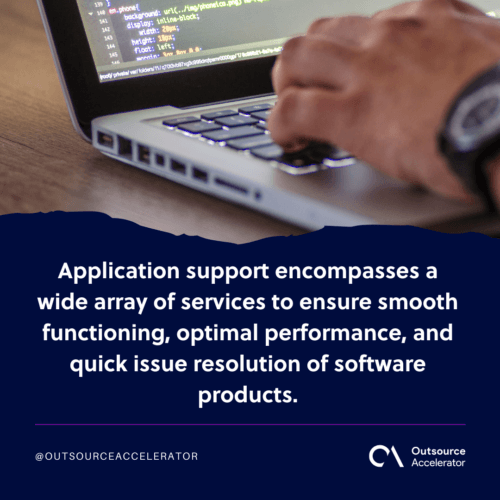A quick guide to application support

App development does not end with the release of your software product in the market. It marks the beginning of its dynamic journey, requiring continuous care and attention.
Users interacting with your application will encounter bugs, hiccups, and, occasionally, more complex challenges. This is where robust application support is pivotal in maintaining user satisfaction, ensuring seamless functionality, and boosting your business’s reputation.
According to studies by TechBeacon, 80% of app users would only use a problematic app thrice or less. 53% of them, meanwhile, have uninstalled an app due to severe issues such as crashes.
While having a support team is undoubtedly a step in the right direction, it’s essential to recognize how they synergize to provide comprehensive assistance.
This quick guide walks us through the basics of application support and how you can improve this aspect.
Defining application support
Application support is the service provided when dealing with application issues. It encompasses a wide array of services to ensure smooth functioning, optimal performance, and quick issue resolution of software products.
Application support can apply to both internal and external software. Internal support for employees and stakeholders is as important as external support for clients and customers.
This service can be divided into two categories: technical support and human support.

Application support vs. Technical support
Application and technical support have distinctions in the services they cover.
Technical support deals with maintaining hardware, networking, and overall IT infrastructure. Tech support teams are more reactive, solving issues as they arise.
On the other hand, application support is focused on enhancing software applications’ performance and functionality. App support teams tend to be more proactive by monitoring software and databases.
Types of application support
Let’s take a closer look at the various types of application support:
First-level support
First-level support is the initial point of contact for users seeking assistance. This frontline team addresses straightforward issues and guides users through basic troubleshooting and navigation.
Their role is vital in ensuring a seamless user experience.
Second-level support
Second-level support is comprised of teams with deeper technical expertise. When a problem surpasses the scope of first-level support, these experts analyze and resolve more intricate issues.
Second-level support is needed to help maintain system stability.
Service desk
The service desk manages incoming requests and streamlines the support process.
This team coordinates allocating tasks to appropriate support levels, ensuring efficient problem resolution. Its organized approach keeps every issue resolved and the process on track.
Incident management
Incident management takes charge during major disruptions such as server problems and global service crashes. This team swiftly resolves critical issues to minimize downtime and reduce user impact.
Incident management ensures business continuity and user confidence by identifying the cause and implementing immediate solutions.
Problem management
Problem management shifts the focus toward long-term stability. This team investigates recurring issues, identifying their root causes and implementing preventive measures.
Addressing underlying problems reduces incidents’ frequency and enhances the system’s overall reliability.
Application support roles you can hire
Application support services cover various roles you can tap into to ensure effective application support.
Some of these roles include the following:
Application support engineer
Application support engineers are troubleshooting professionals. They dive into the code, diagnose issues, and develop solutions to ensure seamless application performance.
They understand the intricate details of the application’s architecture and coding to identify and rectify problems swiftly.
Application support analyst
Meanwhile, application support analysts take a broader view of application maintenance. They monitor application performance, analyze trends, and proactively identify potential issues.

App support representative
App support representatives are the front-facing personnel interacting directly with end-users. They understand user concerns and convey solutions in a user-friendly manner.
These representatives bridge the gap between technical complexities and user expectations.
How to improve your application support services
Enhancing application support services requires a comprehensive approach combining technical expertise, excellent communication, and a user-centric mindset.
You can use the following tips to improve your application support experience:
- Invest in training. Equip your support team with continuous training to keep them updated with the latest advancements in application technologies. This empowers them to address complex issues effectively and provide accurate solutions.
- Use monitoring tools. Utilize monitoring tools to keep a close eye on application performance and user behavior.
- Collect user feedback. Regularly gather user feedback regarding their experiences with the application and its support services. This input can provide valuable insights into areas that need improvement and help you tailor your support strategies accordingly.
- Offer multichannel support. Offer support through multiple channels such as live chat, email, and phone to cater to varying user needs and preferences.
- Prioritize swift issue resolution. Timely issue resolution is paramount. Establish clear protocols for issue escalation and resolution, ensuring critical problems are addressed promptly to prevent prolonged downtime or user frustration.
Alternatively, consider outsourcing application support even with a small team.
Building and operating your own support team requires tons of effort and resources. Delegating this function to experts offshore helps you maximize application support without shelling out too much.







 Independent
Independent




